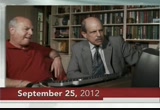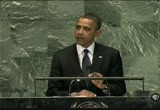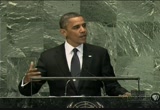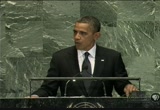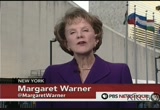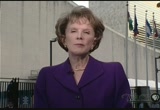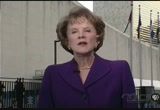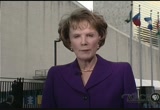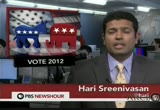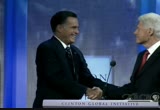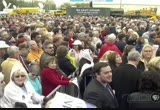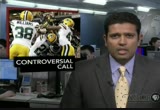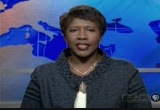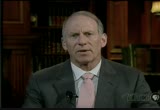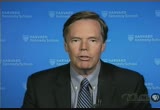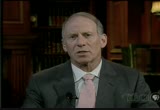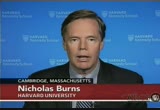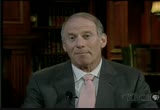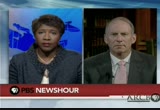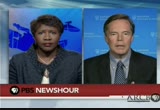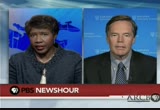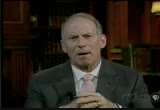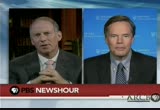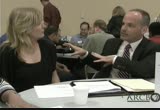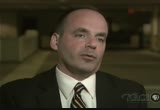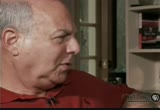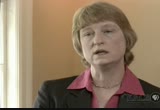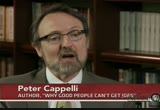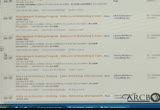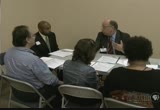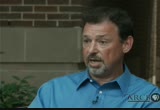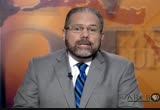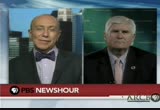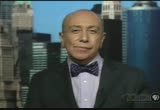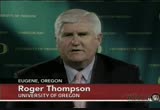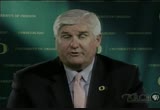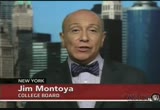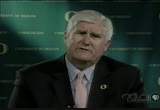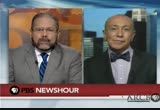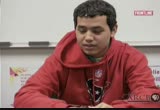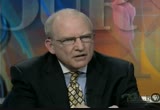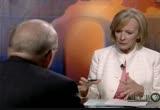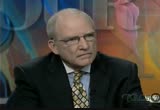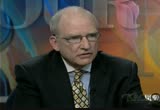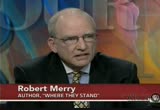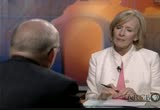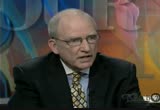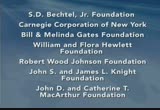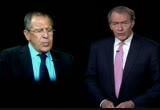tv PBS News Hour PBS September 25, 2012 10:00pm-11:00pm PDT
10:00 pm
>> ifill: then, paul solman looks at why applying for jobs online may just not work. >> woodruff: what's behind the >> check the email and the job sites hourly. fro7:00 in the morning until midnight. >> woodruff: what's behind the drop in s.a.t. scores? ray suarez looks at the surge in the number of students taking the test, and what it tells us about learning. >> ifill: plus, we talk with journalist bob merry. his new book explores how voters, pollsters, and historians judge presidents. >> you can't be a leader of destiny, as i describe it, and change the critical landscape simply because you got elected president and willed to do it. the country has to need that or want that. >> woodruff: that's all ahead on tonight's newshour. major funding for the pbs newshour has been provided by:
10:01 pm
moving our economy for 160 years. bnsf, the engine that connects s. >> intel. sponsors of tomorrow. >> and by the bill and melinda gates foundation. dedicated to the idea that all people deserve the chance to live a healthy, productive life. and with the ongoing support of these institutions and foundations. and... ths program was ma possible by the corporation for public broadcasting.
10:02 pm
and by contributions to your pbs station from viewers like you. thank you. >> woodruff: president obama faced an international audience today against the backdrop of a reelection campaign at home and anti-american violence abroad. the president took the stage at the unitedded nations urging the assembledded leaders to address the wave of anger across the muslim world. >> the attacks of last two weeks are not simply an assault on america. they're also an assault on the very ideals upon which the united nations was founded. if we are serious about these ideals, we must speak honestly about the deeper causes of the crisis. because we face a choice between the forces that would drive us apart and the hopes that we hold in common. >> woodruff: at least 50 people have died in the violence.
10:03 pm
initially sparkd by an anti-islamic video. and u.s. ambassador chris stevens was killed in an assault on the u.s. consulate in benghazi, libya. the president condemned the video, but he insisted there is no justification for mindless violence. >> given the power of faith in our lives and the passion that religious differences can inflame, the strongest weapon against hateful speech is not repression. it is more speech. the voices of tolerance that rally against bigotry and blasphemy and lift up the values of understaing and mutual respect. >> woodruff: mr. obama also had a new warning on iran's nuclear program. yesterday iranian leader ahmadinejad repeated his claim that the program is only for peaceful purposes, an explanation the u.s. and other countries dismiss. today the president said again iran cannot be allowed to build nuclear weapons.
10:04 pm
>> let me be clear. america wants to resolve this issue through diplomacy. we believe that there is still time and space to do so. but that time is not unlimited. make no mistake, a nuclear-armed iran is not a challenge that can be contained. it would threaten the elimination of israel, the security of gulf nations, and the stability of the global economy. >> woodruff: turning to the civil war in syria, the president repeated his call for an end to the bloodshed and to the regime of bashar al assad. >> if there is a cause that cries out for protest in the world today, peaceful protest, it is the regime that tortures children and shoots rockets at apartment buildings. we must remain engaged to assure that what began with citizens demanding their rights does not end in a psyching of sectarian violence. >> woodruff: mr. obama's republican opponent mitt romney cited the same issues before the clinton global initiative conference in new york. but romney implied the real problem is a failure of u.s.
10:05 pm
leadership. >> a lot of americans are troubled by developments in the middle east. syria has witnessed the killing of tens of thousands of people. the president of egypt is a member of the muslim brotherhood. our ambassador to libya was assassinated in a terrorist attack. iran is moving toward nuclear weapons capability. >> woodruff: romney used tougher language yesterday in pueblo, colorado. then he criticized the president's remarks in his 60 minutes interview that the arab spring brought many challenges for the u.s. and that there would be bumps in the road. >> these are not bumps in the road. these are human lives. these are developments we do not want to see. this is time for the president who will shape events in the middle east not just be merciful or be at mercy to the events in the middle east. >> woodruff: the president also spoke before the clinton global initiative today, but he did not meet with any foreign leaders.
10:06 pm
instead secretary of state hillary clinton had one-on-one with the u.n. special representative to syria and a number of other officials. margaret warner is at the united nations. i spoke to her just a short time ago. hello, margaret. so what message was president obama in his speech and secretary clinton in her meetings trying to send? warner: judy, i think the way to look at this is a tough love speech from the president and also privately from secretary clinton. and that is to the leaders of these post revolutionary countries that are now trying to make this transition -- and they have to stand up to violence and intolerance in their own societies and extremism -- and president obama said, you know, it's not that we endorse hateful speech. we thought the video was offensive but even when i am criticized with hateful speech, he said, i will fiercely defend the right of people to say it. he also gave them a very practical reason. he said, you know, you're not
10:07 pm
going to be able to deliver to people what you promise, what they elected you to do, which is jobs and prosperity, unless you get an investment and you won't get it with that kind of violence. >> woodruff: what about inside the general assembly. what was the reaction there to the president's speech? >> warner: judy, it was a lot more muted than four years ago when he came here and there was great hope and expectation. people stood in the aisles waiting, standing-room only. this time was it muted. there was polite applause. there was even somewhat enthusiastic applause for a couple of lines. but a senior diplomat of a major muslim majority country said to me afterwards, it was really a campaign speech. we all understand that there's very little that he can do, president obama, on syria or any number of other issues until after the election. that also explains why there were not super high expectations for him. >> woodruff: picking up on that, know secretary clinton has met with the leaders of a number of
10:08 pm
muslim countries. that was the message she was trying to send? >> really the same message. clearly they had a big agenda, you know, with pakistani president they wantedded to talk about afghanistan. there are a lot of issues and so on. in terms of the theme of the which has to do with how the u.s. and these countries are going to pull together, her message, one aide said to me, is, look, when these kinds of things are rough, leaders have to stand up. we know it's very hard. you have to find a way to channel their rage or let people express it, even express the outrage yourself at something like that video. but this is the tough part about being a leader. if you let it get out of hand, it's going to engulf you as well as your neighborhood. >> woodruff: and finally, margaret, what about what the president had to say about iran in his remarks? how closely was that... how close was that to what the israelis were looking for? >> warner: well, judy, the
10:09 pm
president said publicly now in an international forum, what he has said to smaller audiences in the past which is containment is not an option with a nuclear-armed iran. we must prevent it. what he did not do is define what he means by prevention or at what stage which prime minister netanyahu of israel has wanted the president to do, to set the times earlier than before they get a weapon which is when they get this total breakout capacity. they have so much uranium, they can break out in a matter of weeks or months and make a weapon. but talking to the israelis, they won't say anything publicly. they have no comment. but privately i was told they were not surprised that president obama was not going to set or did not set a red line for iran, that if you cross this red line, there will be consequences to pay. because he made that very clear to prime minister netanyahu in their hour-long speech about nearly two weeks ago.
10:10 pm
>> woodruff: margaret warner, thanks very much. covering these u.n. meetings for us all week. >> warner: thanks, judy. >> woodruff: you can watch all of president obama's speech to the general assembly on our website. and we'll be live-blogging events at the u.n. through thursday. >> ifill: coming up, more on america's role in the world, plus, the perils of hunting for jobs online; why s.a.t. scores are dropping; and a guide to evaluating presidents. but first, with the other news of the day, here's hari sreenivasan. >> sreenivasan: the president and his challenger spent only part of their day focused on foreign policy. newshour correspondent kwame holman reports the domestic agenda was never far away, as the campaigning continued. away from the u.n. stage, the president and mrs. obama targetedded female voters in a tapedded appearance on abc's "the view." they both focused again on what is best to revive the economy. >> we grow fastest when the middle class is doing well and
10:11 pm
when folks who are trying to get in the middle class have ladders of opportunity. that's a different vision about how we move the country forward. ultimately it will be up to the american people to make a decision about who has got the better plan. >> i'm voting for him. reporter: this morning republican mitt romney was welcomedded warmly at the clinton global initiative. the former president praised him for supporting the americorps program. >> governor, i thank you for being here. the podium is yours. >> thank you, mr. president. reporter: romney returned the compliment with a joking reference to clinton's speech nominating president obama at the democratic convention. >> if there's one thing we've learned in this election season, by the way, it is that a few words from bill clinton can do a man a lot of good. all i got to do now is wait a couple of days for that bounce to happen. >> reporter: from there, romney turned to education policy at a forum sponsored by nbc news.
10:12 pm
>> we have proven that sending a lot of money to failed schools to pay the same teachers to do the same things will not make any difference. the real key is leadership in drawing the best and brightest to the profession, giving them the right incentives, promoting the very best, helping our students have discipline in the classroom, insisting on the participation of parents. >> reporter: the candidate new york city stop came as another poll. this one from the "washington post" found ohio swinging toward the obama column. no republican has won the white house without ohio. with that in mind, romney and running mate paul ryan began a bus tour through ohio this afternoon. >> sreenivasan: the u.s. supreme court upheld west virginia's congressional redistricting plan today. critics of the redistricting had argued that the populations within newly drawn districts were too far out of balance, but the supreme court reversed a lower court ruling and said the state legislatures was correct
10:13 pm
in trying to keep counties intact, keep incumbents from facing each other, and minimize shifts in population. the lower court may still consider challenges to the plan under the state constitution. in economic news, a key index showed home prices rose again in july-- another sign the housing market is on the road to recovery. and a separate index had consumer confidence rising in september. but it wasn't enough to help wall street, amid new worries about spain's debt troubles. the dow jones industrial average lost 101 points to clclose at 13,457. the nasdaq fell 43 points to close above 3117. the national football league faced an explosion of calls today to end a labor dispute with its referees after a mistake decided the green bay- seattle game. with seconds left, seahawks quarterback russell wilson launched a hail mary pass into the end zone. receiver golden tate was awarded the touchdown, even though a packers player also grabbed the ball and appeared to control it. the replacement officials made conflicting rulings, but they fi and the win. today the league acknowledged it was a bad call, but it let the
10:14 pm
result stand. starting today, anyone can hold albert einstein's brain in the palm of a hand. the national museum of health and medicine in chicago has launched an ipad application that includes 350 images of the amed scienti's brain they show slices of brain tissue made after the nobel winner died in 1955. in later years, a study found the part of einstein's brain that aided in math and spatial relationships was larger than normal. those are some of the day's major stories. now, back to gwen. >> ifill: we return to president obama's unitedded nations' speech and what it tells us about his administration's foreign policy challenges. for that we turn to harvard university professor and former u.s. ambassador nicholas burns and richard haas, president of the council on foren relations. welcome to you both. starting with you, richard haas, let's take an overview. is the obama foreign policy defendable four years later? >> for sure it's defendable. it's not to say it's flawless.
10:15 pm
but he can point to obviously the killing of osama bin laden. he can point to, among other things, the attempt to improve relations with china and russia. obviously he's got the uwe united states out of iraq. the united states after going up has now come down to some extent in afghanistan. he mdleast,ven though it's turbulent, is more open than it was. so i think the president in general can point to some areas where he moved forward and some areas obviously his critics will say where he movedded back. all in all it's a defense i believe and defendable record. >> ifill: i want to walk through some of that piece by piece. referencing the president's speech today, he turned over a big chunk of it to talking about the difference between railing against or speaking out against violence... violent extremism versus protecting free speech. why was so much devoted to that topic? >> gwen, i thought it was an interesting speech. very reflective speech. i think probably designd by the president and his advisors to
10:16 pm
try to heal some of the wounds that have been so apparent between the muslim world and the united states over these last two weeks, these very tragic weeks. i thought it was interesting the way he framed the issue. he clearly disassociated the united states from that hateful and vile video produced in california. he twice spoke against... about the need to respect islam and respect the prophet of islam. but at the same time he spent a lot more time and was passionate about defending free speech and trying to explain to some of these world leaders in this hall the american traditions on free speech and he used himself as an example. he said in effect i'm criticized every day. people laughed in the hall. but i defend the right of those who criticize me. he said, you know, if we begin to curb free speech especially overseas beyond america, that stifles dissidents, it stills their voices and oppresses minorities. i thought it was a unique way of talking about freedom of speec that was in many ways the major
10:17 pm
focus of this speech. >> ifill: yet, richard haas, he seemed to concede that there are tensions under the surfaces not just about the video, tensions between the arab world and the west and not just the u.s. >> absolutely. and there are. but i thought the important part of his message is not simply that we believe in free speech and at the end of the day it's impossible to filter everything that goes out of the internet, but also it's the first responsibility of governments to control the mobs, to essential... they have the obligation to keep diplomatic missions safe. and there's always going to be things that people aren't going to like. but at the end of the day, people in these societies have delegitimize violence and essentially say no matter how much you disagree with what someone says or writes, it does not give you the right to go out and cause violence. if they do, you the governments have to stop it. that's your obligation under various international charters, under the united nations. i think that's an important message for the world to hear,
10:18 pm
an important message for the egyptian government to hear. >> ifil nick burnslet's talk about two sticky points when it comes to foreign policy: iran and syria. in both cases in the speech he said we need to speak out against it whether it's assad leaving or syria stopping the slaughter of its own people but he didn't outline exactly what the u.s. would do next about that. that's what some of his critics have said he has come up short on. >> well, it's a real problem for the president because, you know, he's been trying to balance competing american interests since the beginning of the arab revolutions in january of 2011. on the one hand we've clearly supported reform and elections and democracy in places li tunisia, egypt, and with nato force in libya. but on the other hand the president has clear decidessed it's not possible for the united states to be intervening the syria. it's an entirely different set of problems for the united states and he also has a divided security council in new york, the russians and chinese will not support any overt move to aid the rebels or to intervene
10:19 pm
militarily by the united states. so what he had today was rhetoric. he called against for assad to leave power, but there's really nothing behind that. and his administration has dided not en to arm the rebels. so he's been criticized for that by some people. he's been lauded by others who believe that intervention would be a mistake but it's clearly a source of frustration for the administration. >> ifill: is there a way out of that frustration, richard haas, or is it just a place where only rhetoric can serve. >> ambassador burns krebtly said there's a gap between american goals which is to see the regime and leadership go and american means which are quite limited. the united states could do more to help the opposition. that's probably the main realistic avenue for policy to narrow the gap. but even that doesn't necessarily close it. it's quite possible in two months or four months or six months bashar al assad will still be in power and thousands more syrians will be dead. i don't think there's a lot o
10:20 pm
of... we can do unless we're willing to go in. even if we did go in, it could be very difficult. what we can't assure is that we can put something into place that would be demonstrably better. it's the problem with these humanitarian interventions. >> ifill: how about the issue involving israe there have been a lot of tensions there as well. the present nt outf his way to say we should not endorse the desecration of mohammed any more than we should endorse the deniers of the holocaust, linking that in common cause. did that go a long way toward mollifying some of that tension? >> well, i thought that was a good point. he also talked about the need for a secure jewish state. something that would be well received in israel. at the same time he called for a separate, prosperous palestinian state. but i think the main issue for the israelis is question of iran. and there the most interesting thing of what the preside said was the idea that the iranians don't have unlimited amounts of time in order to see these negotiations play out. the united states is not
10:21 pm
prepared to see them use negotiations as a stalling tactic behind which they could continue to enrich uranium and get closer to a nuclear weapon. what the president did was set is stage for a debate that would come which is how much time is enough to give negotiations a chance but not too much to the iranians essentially use them to create facts in the way of their nuclear program. my sense, gwen, is that will become the al area of focus for whoever wins this election. >> ifill: nicholas burns, did you see any movement in the president's speech on that point? >> i thought the president was speaking clearly to the iranian government and people. he was in effect warning them that we just can't go on and on with iranian op strep russness at the negotiating table. he came down on the side of negotiations backed up by sanctions and the threat of force. he clearly wants this problem to be kicked into 2013. i think rightly so. i would anticipate if he is re-elected some kind of negotiation with the iranians but the president said
10:22 pm
containment won't work. he clearly signaled he's ready to use force if necessary. if i were the iranian leadership i would take that as a clear warning shot from a president who has got a lot of support in that hall internationally. i think a lot of support here at home that we ought to try to diplomacy before we consider force. >> ifill: all of this, of course, is against the back drop of a political campaign, nicholas burns. mitt romney has been in the last day or two. he's been saying among other things that the president treats all of these setbacks as bumps in the road. he's not taking this seriously. he's lacking in leadership. what would be different, based on what we've heard him say, about what a president romney would do on these issues? >> well, if you listen to the romney campaign and to governor romney himself, he seems to have a more marshal approach to international affairs. he seems to think that maybe by leading with military force, by being more bold on the international stage, america can be defended ber. but i think that governor romney has not been able to articulate
10:23 pm
a compelling vision of how he would actually strengthen america. he's been vague about when he would get us out o afghanistan. i think frankly he has not really spoken very clearly about how he really differs from president obama on iran. i suspect their two positions are fairly close actually. >> ifill: on the same point, richard haas? >> i actually think there is a difference on iran. the president is clearly saying that iran cannot be allowed to have a nuclear weapon. governor romney has been stricter that they can't be allowed any enriched material and clearly he wants to stop iran somewhere short of a nuke already weapon. i think again that's going to be part of the debate. what is it we can tolerate? can i make another point for a second, gwen? amidst all sound bites of the campaign i thought today was a good day. the president gave a serious speech at the united nations sending some important messages to the middle east. he also gave a serious speech at the clinton global initiative about the importance of stopping human trafficking and modern-day slavery. at the same time governor romney
10:24 pm
gave his most thoughtful speech of the campaign about foreign policy, aid and foreign economic policy, the importance of introducing market incentives into our foreign economic policy. so all in all after all the sound bites and after all the negative clips, today was a thoughtful, positive day for american politics. wherever you come out in the political process i actually thought it was again the best day of the campaign season. >> ifill: always good to have a thoughtful, positive day. richard haas president for the council of foreign relations, ambassador nicholas burns at harvard kennedy school. thank you both so much. >> thank you. >> woodruff: next, a new dispatch from the difficult job market. newshour economics correspondent paul solm has long chronicled st how tough it is to get hired. tonight he looks at how one of the big changes in recent years-- applying online-- is not working for many seeking a job. it's part of his ongoing reporting, "making sense of financial news."
10:25 pm
reporter: at mclean bible, a mega church in vienna, virginia, the appropriately mega career network ministry. in a labor market increasingly dominated by on-line job search, this weekly event features sessions on taking psychological test, selling yourself to interviewers... >> i've been working in the consulting industry for the last 15 years. quite frankly, i love it. >> reporter: ... marketing the brand that is you. >> the resume does not tell what you've done in the past. the marketing sense tells you what you want to do in the fuse. >> reporter: ministry volunteer john franklin practices what he preaches. whether he's employd, as he was at the time of this july taping, running training sessions for the state department or unemployed as he was soon after, he is always looking for a job. >> because that's the nature of the job market today. if you get laid off today from a position, it could take you anywhere from nine months to two
10:26 pm
years to find another job. those lay-offs can come at any time. your phone could ring and someone could say, "we're very sorry. please pack up your things." someone will walk you out the door. i've gone through that. 0 minutes later i was out on the streets just like you see in the movies. >> reporter: you would think that with help wanted ads moving from print to the internet job searching would be easier these days but no says john franklin. it's making things harder. >> lot of people come in here with all the on-line ads, they've put dates on them and notes. they haven't heard anything back. i honestly think if you're going to be spending the bulk of your time at home doing nothing but answering job ads for eight hours a day you won't find a job. >> reporter: eight hours a day? that's for... >> i check the email and the job sites hourly. >> reporter: hourly? from 7:00 in the morning until midnight. >> reporter: monster dot-com has
10:27 pm
55 openings for this long-time i.t. sales executive. unfortunately... >> 18 of them are basically straight commission selling lighting product jobs. they're not i.t. jobs. they're not high-paying jobs. >> reporter: okay. so there must be something on here out of 55. >> well, here's a job for selling mattresses at sleepies on straight commission. >> reporter: over a career-builder dot-com, 25 openings supposedly tailored to his experience. >> here's a job. the welcome wagon. you know what the welcome wagon is. when somebody new moves into the neighborhood they come out and guest you a bottle of wine and free coupons. >> reporter: would you take a job with welcome wagon? >> no, because it would be a part-time, no benefits no salary job. >> reporter: enterprise rent a car. entry level sales manager trainee. >> at my age and based on my experience the reality is even if i wanted an entry-level job i wouldn't be considered. i've tried that.
10:28 pm
it's resulted in zero responses. >> reporter: and yet after two years without a single job offer, he keeps pluging away. >> as a salesman, you get a lot of no's before you get yes'. but if you haven't been an outside salesman and you're trying to find a job in this marketplace, i honestly don't know what people do. >> reporter: some just give up. as did sharon moore, unemployed for two years, when we interviewed a group of the long-term unemployed last spring in bridgeport connecticut. >> i wanted to apply for a state of connecticut job. it's daunting. if you don't get to it in a certain amount of time, it just kicks your resume out. >> reporter: really? you mean there's a time limit? >> yes. sorry. you've taken too long. we're timing you out. start again. >> reporter: did you start again? >> no. (laughing). >> reporter: because you were too annoyed. >> it was 23 pages of stuff that you have to go through.
10:29 pm
i felt like i need a ph.d. just to get through the application process. >> reporter: joyce hirsch has a ph.d. from cornell and a law degree and ten years' experience as a biotech patent attorney. but credentials don't seem to impress the software. >> i do a lot of networking. i need a lot of other professionals in related fields accounting, finance, regulatory, all kinds of things. there are a huge number of really amazing people out there who are in a similar situation. they can't get past the on-line software. they just can't seem to get an interview. >> reporter: so what's going on? are these frustrated job applicants overqualified, underexperienced? is it their age, their gender, their race? none of the above, says wharton professor peter kapeli. >> from this point on, the companies decides, you know what we can't have people coming in off the street to do these jobs.
10:30 pm
>> reporter: he thinks the problem is that firms, big and small, have eliminated human beings from the hiring process. >> they're trying to do things cheaply and efficiently but most of them, i think, don't have the historical memory to even know that they didn't used to do things this way. >> reporter: his wall street journal article last year about job recruitment prompted a flood of responses and his latest book: why good people can't get jobs. >> i got 500 emails from the first article. people who have applied for jobs in their own company, for example, and couldn't get hired. they pretended to be an applicant with the same abilities and resumes they have. they got kicked out of the process. somebody told me that they had 29,000 people apply for a reasonably standard engineering position. and nobody made it through the screening process. the software told them nobody was qualified. >> my view is absolutely insane. reporter: executive recruiter runs an alternative website for job seekers. ask the head hunter dot-com.
10:31 pm
>> you have hiring managers who have a certain kind of work they need to have done. they write a simple description. this gets reduced to a bunch of key words. you have people trying to meet the key words in the job description. >> reporter: or game the whole process. >> there are people i've known who have taken the entire job description verbatim and plugged it into a part of the resume not necessarily the top. they plug it right in. they submit it. they make it through the first few rounds. >> reporter: don't companies know this? why would they still post ads online when surveys suggest that no more than a few percent of all jobs ar filled this way? >> whenever i do a presentation i almost always ask the question, raise of hands, who found a job through a major job board? and virtually no one. >> reporter: none of the internet job sites including monster and career-builder would grant us an interview. but back at mclean bible church, our own data suggested that they do have some reason for being.
10:32 pm
>> how ma of you have gotten a job through an internet job board? more than just a few percent. what job? >> i was a vice president position. education training with an association. >> reporter: when was this? 2003. in the past 20 years all the positions i've obtained have been through internet job boards. >> reporter: is it as effective today as it was in the beginning, do you think? >> no. compared to 1990 there' lot more competition sphrt and as we and others have often reported companies are in the driver's seat these days which is why networking groups have proliferated. >> several people are going to to have perfect first-level contacts. >> pound the pavement. make phone calls. contact alumni organizations, go to job fairs and build those kinds of networks that enable you to make the contacts that will get you the job. >> get around the system. reporter: peter takes it a step further. >> get to somebody who knows the
10:33 pm
person, who is doing the hiring and can make case to them. you know, that's best way around this conundrum of the applicant tracking systems and the software not being smart enough to process everybody correctly. >> reporter: and perhaps you shouldn't even bother with on-line applications, says nick. >> the whole secret is think carefully about where you would like to work. even if you're young, life is short. you're going to have very few good jobs in your life. ask yourself, who are the shining light companies you'd love to work for? pick those companies out and go pursue them like a mad dog. >> reporter: not the most encouraging advice for a rational human. >> they keep saying there's thousands of jobs o there. i only one want. >> reporter: but perhaps more practical than relying on signer space in 2012. >> woodruff: on our website we profile two people who have been >> woodruff: on our web site, we profile two people who have been burned by the complexities and frustration of job hunting online.
10:34 pm
and we're taking your job search questions for expert headhunter nick corcodilos. submit those on paul's making sense page. >> ifill: next, two education stories. the first is about whether students are ready for college and what the s.a.t.'s tell us. ray suarez has that. >> suarez: the latest scores are out for the high school class of 2012, the new freshmen starting work at colleges across the country-- and the news is not good. the college board, which oversees the s.a.t., reported that 57% of seniors do not seem ready for college based on their test scores. the board also reported that reading scores have fallen to their lowest point in four decades. out of aerfe score of 800 in each category, the mean reading score fell slightly to 491; writing dropped by a point to 481; and math dropped one point to 505. since 2008, reading and writing
10:35 pm
scores have dipped, while math has remained stable. what do these scores tell us about students' readiness? we get two views. jim montoya is a vice president of the college board. he is a former dean of admissions for stanford university. and roger thompson is the vice provost for enrollment management at the university of oregon. the system s more than 24,000 students, 20,000 of which are undergraduates. mr. montoya, if as the college board maintains, s.a.t. measures the skills needed for college success. what do some of the lowest scores in 40 years lead you to conclude? >> well, what we are to conclude is that students need to take more rigorous courses. in high school. we have to have higher expectations of our students. what we know is this. that of those students who complete a core curriculum, four years of english, at least three years of mathematics, at least
10:36 pm
three years of science and at least three years of social science, comparedded to those who students who did not complete a core curriculum, those students completing a core curriculum scored 144 points higher on the s.a.t. >> suarez: what do we know about the predictive value of the test itself? you have a threshold for college readiness. if you go into an institution of higher learning without reaching thathreshold, a u automatically going to fail, not complete? what do we know? >> absolutely not. that threshold is a guide. it allows us to look at groups of students. what we know is that the group of students who meet the threshold have a 65% likelihood of achieving a b-minus g.p.a. or higher during their freshman year. obviously there are other factors that admission officers take into consideration. but it does help guide us in thinking about where we are and
10:37 pm
the need to have more students better prepared for college. currently of 100 ninth graders, 44 will go on to college. yet only 21 will graduate within a six-year period. this is highly problematic. >> suarez: roger thompson, are you seeing those low scores in your applicant pool and your entering classes? >> well, we're certainly seeing more students take the s.a.t. i think that's o of the things that we need to think about when we consider how scores are changing over time. if you look at the test scores, we've got far more students participating than we did 20 years ago. that creates sort of a two sides to the same coin. with more students participating, naturally we're going to have more students who are not college bound taking the s.a.t. in one sense that drives the score a little bit lower. on the other hand, we are seeing
10:38 pm
some challenges particularly in math and science. you cited the changes that we've begun to see in the verbal and rding all of that leads me to be concerned as an administrator about the preparation that's happening in our k-12 school systems around the country. >> suarez: what kind of feedback are you getting from your instructors who teach freshmen? are they not as prepared as they ought to be? >> well, i think we're fortunate at the university of oregon in that we see more prepared students than maybe some others in the higher education marketplace. but what our faculty are indicating is that our students are doing well but mathematics continues to be a stumbling int for alot of students. not just at the university of oregon but across the country. we just had our high school advisory board in last week. this is made up of principals from around the country. and one of the things that we focused on was how do we create reasonable rigor in high schools so that a student is taking a
10:39 pm
curriculum that challenges them yet also prepares them for college and leads them to a higher success rate when they get here? >> suarez: jim montoya, the class of 2012 has grown up, almost their entire k-12 ceers,nder the new established ardz of "no child left behind." they've been tested an awful lot. how come that hasn't prepared them to do better on the s.a.t.? >> well, again the focus has to be on the rigor of the curriculum as roger points out. i think we have to hold our students to a higher standard. i think we have to make absolutely certain that students are just not taking the minimum core curriculum but are taking honors courses, takinged advanced placement courses, courses that will better prare them for the rigor that they will face once in college. >> suarez: roger thompson, same question. has "no child left behind" and more consistent standardized testing created a pool of
10:40 pm
students that should be no strangers to sitting down for a long, demanding test? >> yeah, i really agree with your comment. i think if we look at this generation, they've grown up as the most tested, probed and analyzed group probably in a long time. so i think it's not about test anxiety. that was something we heard years ago. i don't think that's as big an issue now. when you think about what helps a student succeed, i think of three things always. that's academic preparation. social integration. and financial. if we were to look at our college students entering today, i think two of those three are really problematic. you know, academically we have a lot of school districts not just in our state but across the country that are really cutting back on some of their course offerings. th economyhased schools to consider things that i don't think they would have considered 15 or 20 years ago.
10:41 pm
then when you combine that with the financial challenges that families face, the first place a family turns many times to support their child's education is their home. with home equity loans. home values are down. i think there's a lot of things that are stressing our students and our families. those are factors. academic preparation is one big factor that can prevent success. >> suarez: ickly, jim montoya, before we go. respond to roger thompson's point about family finances and the downward pressure that might put on scores. >> there is no question that as families look to the cost of college, certainly they worry about how they're going to pay for it. but i go back to the important point that roger made in regards to academic preparation. more of our students need to be enrolled in rigorous courses that will prepare them for the challenges they will face i
10:42 pm
colge. >> suarez: jim montoya, roger thompson, gentlemen, thank you both. >> thank you. woodruff: to our >> woodruff: and to our second story on education. as part of american graduate week, we are looking at the problem of high school dropouts. tonight frontline reports on what a houston high school is doing to make sure at-risk students graduate. sharpstown high school has often been thought of as a dropout factory. but teachers and administrators are trying to change that. here's an excerpt about one of the former dropouts who's profiled. 18-year-old marco is dealing with a complicated family situation that jeopardizes his chances. >> i was learning everything just... like my whole life changed. just seeing my mom cry made me not want to go to school anymore and help me pay had the bills and help my little sister stay in school. i dropped out for a whole semester.
10:43 pm
i was 17 at the time, 16. i was like working 40 hours or more a week which i still do. i didn't get out until 3:00 in the morning, 2:00 in the morning got home around 4:00 or 5:00 and sleep like three or four hours and i don't know how i got used to that life. i just had to suck it up. my mother she cared. she used to tell me you're going to go back to school one day, right? i was like yes mom i have to graduate from high school no matter what. my brother didn't do it and i don't want to be cutting grass like him. one day i was coming home from work and i saw this sign. i was like i need to come back like i have to go back to school. >> when marco came to school he
10:44 pm
was so happy. he goes, "i came back to school. you know i dropped out but i'm really going to give it a try." however, i must be transparent with you. it's a big push for him to graduate on time right now. >> marco is no angell. every day isn't a wonderful adventure with marco. while it is an adventure it's not always wonderful. >> first of all i want to talk about marco's behavior in class. you know there was an issue in your classroom the day before yesterday. >> we're trying to help push him through a process. he's going through a process right now. >> when marco came to the classroom thought he was going to do well. he started acting out. i tried to talk with him. i called his parents. i was unable to get them. >> marco's mother is in the process of being deported. that's pretty much the reason why when you were making those phone calls at home you could not reach a parent.
10:45 pm
>> moi mom was arrested january 1. i was worried about my mom getting deported. >> to be in this position where your father is already gone and now you're at risk of having your mother be deportedded, that's a lot. >> i just lost it because i snapped out real quick. i couldn't control it. it was something that i had to do was control my emotions and my behavior and just, you know, be the bigger person and just walk away from it. >> do you know that with all that's going on, marco is here at 7:45 in the morning with all of this going on. to me, you know, yes, he's at risk. he's tremendously at risk but is the student trying? yes. does the student always make the right decisions? no. >> do you think we're going to see him in a cap and gown. >> we better see him in a cap and gown at the end of the semester. i want to say yes. however, if we do not we're going to lose him and ypt to
10:46 pm
lose him. >> ifill: you can find out whether marco graduates on "dropout nation," airing tonight on most pbs stations. "american graduate" is a public media initiative funded by the corporation for public broadcasting. you can also join a live chat tomorrow with key players from the documentary. submit your questions now on our web site. >> woodruff: finally tonight, a new book compares how historians view presidents with how voters view them. it comes from journalist bob merry, editor of "national interest" magazine. "where they stand: the american presidents in the eyes of voters and historians" identifies the greats, near-greats, flat-out failures, and those whose legacies have fluctuated. i spoke with merry last month. bob merry, very early in this book you say you're not a personal fan of the ups and downs of rating presidents but
10:47 pm
you decided to wri book about that. why? well, i like the game. i think we rate first basemen and shortstops and great singers. we rate our presidents. it's inevitable because we've got our er to and the see is at the fulcrum of american politics which means it's at the fulcrum of american history. the question is who are these guys and how do they operate and how do we assess them? i think this is what i bring to this decision is how do the american people assess them at the time? that's what i try to get into because i think that's what's fascinatin >> woodruff: you also say early on that you found the judgment of historians, of history, largely coincides with the views of voters. the electorate at the time these men held office. why do you think that is? >> well, i think it's because the voters are not foolish. the historians understand that the voters know what they're doing when they make these judgments every four years.
10:48 pm
i think that's why president obama's statement which he made a year into his presidency that he would rather be a really good one-term president th a mediocre two-term president doesn't really make sense because if you're shooting for history, you need to go through the american voter in order to get that good judgment from history. >> woodruff: you also say i think toward the end of the book you point out you think the president really does want to be elected to a second term. there's no question about that. >> i think we see that everyday, don't we? >> woodruff: the book really is a walk through history. we don't have time to go through all the categories but tell us what the most successful presidents have had in common? what do we see in them that we haven't seen in the oth presidents? >> the presidents that i call leaders of destiny are the presidents who are consistently ranked highly by the historians and the historian polls the rating the president gain. number two they are two-term presidents succeeded by their own party meaning that the
10:49 pm
electorate liked them at the time and number three they all set the country upon a new course. they changed the political landscape. those presidents that i identify are washington, jefferson, jackson, lincoln, t.r. and f.d.r., and i think that reagan who is not there in terms of the historical poll but in the other two criteria may get there as well eventually. >> woodruff: at the other end of the spectrum the presidents who didn't make it, i mean, without going through that whole list, what is it that causes presidents not to make it? what causes them to stumble? >> you know, these presidents are all amazing politicians. you don't become president without being a great politician. but this is a tough job. it's going to crush people who don't know how to grab hold of leaders of power and move them in the right direction. jamesuchanan, i consider him to be our worst president. james buchanan was electedded four years before lincoln. the country was in crisis. it was in dead lock. it needed a leader who could
10:50 pm
break that dead lock. he proved not only incapable of doing it but he wasn't even very interested in trying to do it. therein lay his failure. he deserves to be down there as a result. >> woodruff: is it a matter of the eternal question, a matter of the times or the man? or both? >> that's a great question. you can't be a great... you can't be a leader of destinys i describe itnd change the political landscape simply because you got elected president and willed to do it. the countr cup to need that or t that. not every president is elected in that time. so a leader, a great statesman can not really be effective unless he knows the quality of his time. take eisenhower is a great example. eisenhower did not try to dismantle the new deal. many of his republicans in that party wanted him to but he knew better. he knew that he still lived in the new dealer a even without osevt. therefore he wasn't going to try to dismantle it or repeal it.
10:51 pm
so he understood the temple of his times. >> woodruff: bob merry, you and i were just talking about the politically polarized time that we're living in now. is there something about today's hyper partisanship do you think that makes it harder to be a great leader, to be a great president or is that always been the case in one way or another? >> this is a very difficult time to be an effective president because the country is in dead lock not just in dead lock over normal issues but over issues that get to the definition of o nation. when that happens, as it did in 1850s, the country is... becomes very difficult to rule. it takes a president like a lincoln or like a roosevelt or like a jackson or a jefferson who can actually do that. whether we'll get that president through this election is really very much an open question it seems to me. >> woodruff: if you're a voter, bob merry, and you're reading this book, listening to you right now, you're looking at these two candidates this year, the incumbent barack obama, the
10:52 pm
challenger mitt romney, what test do you apply to them as you think about who would make a good president to bring us through this difficult time? >> i say in this book that i believe that presidential elections are largely referendums on the incumbent or the incumbent party. therefore i think the voters are going to ask the question that ronald reagan put so succinctly and is so brilliantly, are you better off than you were four years ago? or maybe even better, judy, is the country better off than it was four years ago? they will ask that question as they always do in these referendum elections. they will ce up with the answer. >> woodruff: you know, on that point, bob, you call for the candidates to campaign with an eye to governing. to think ahead to what it's going to be like if they're elected, if they're serving. are they doing that in this election, in this campaign? >> no, i don't think they're doing that. if you believe, as i do -- and others may not -- that these elections are referendums, then
10:53 pm
it means that the incumbent needs to run on his record. the effort to dismantle and destroy the image and the standing of his opponent, that doesn't really make a lot of sense. it's harmful actually in terms of how he's going to bring the country together once he's re-elected, if he is re-elected. in the case of the challenger, he needs to... if you take my thesis, what he says isn't going to make a huge amount of difference because it's the record of the incumbent that is going to be the answer to the question of who wins. but if he wins, he's going to have to govern. that means he's going to have to have a mandate. he can't have a mandate if he's just giving squishy soft answers to questions tat a facg the country. that's why i think that the selection of paul ryan is probably healthy in regard of sharply delineating the issues. >> woodruff: because the choice is clearer. >> correct. woodruff: that's what you're saying. bob merry. the book is "where they stand:
10:54 pm
the american presidents in the eyes of voters and historians." thank you very much for talking with us. >> thank you, judy. i enjoyed it much. >> ifill: again, the major developments of the day. at the united nations, president obama condemned violence in the muslim world. he told world leaders time is running out to resolve differences over iran's nuclear program. and republican mitt romney hit the road on a new bus tour of ohio, as polling there showed the state sliding toward the obama column. as we reported earlier, the housing market is on the rise. find out how much online. hari sreenivasan explains. >> sreenivasan: on our making sense page, you can play with our interactive graphics and track the price index in 20 different u.s. cities. plus, you can follow the ups and downs for an average home's selling price. all that and more is on our web site, newshour.pbs.org. judy? >> woodruff: and that's the newshour for tonight. on wednesday, we'll look at the presidential campaigns targeting young voters in ohio. i'm judy woodruff. >> ifll: and i'm gwen ifill. we'll see you online, and again
10:55 pm
here tomorrow evening. thank you, and good night. major funding for the pbs newshour has been provided by: >> bnsf railway. >> and by the alfred p. sloan foundation. supporting ience, technology, and improved economic performance and financial literacy in the 21st century. and with the ongoing support of these institutions and foundations. and... this program was made possible by the corporation for public broadcasting. and by contributions to your pbs station from viewers like you. thank you. captioning sponsored by macneil/lehrer productions
10:59 pm
>> rose: welcome to the program. tonight a conversation about russia and its foreign policy with the foreign minister, sergey lavrov. do you think you are on the wrong side of history. >> you can only judge when history evolves and we are now watching htory the making. when my good friend colin powell. >> rose: colin powell. >> was s
195 Views
IN COLLECTIONS
KRCB (PBS) Television Archive
Television Archive  Television Archive News Search Service
Television Archive News Search Service 
Uploaded by TV Archive on

 Live Music Archive
Live Music Archive Librivox Free Audio
Librivox Free Audio Metropolitan Museum
Metropolitan Museum Cleveland Museum of Art
Cleveland Museum of Art Internet Arcade
Internet Arcade Console Living Room
Console Living Room Books to Borrow
Books to Borrow Open Library
Open Library TV News
TV News Understanding 9/11
Understanding 9/11